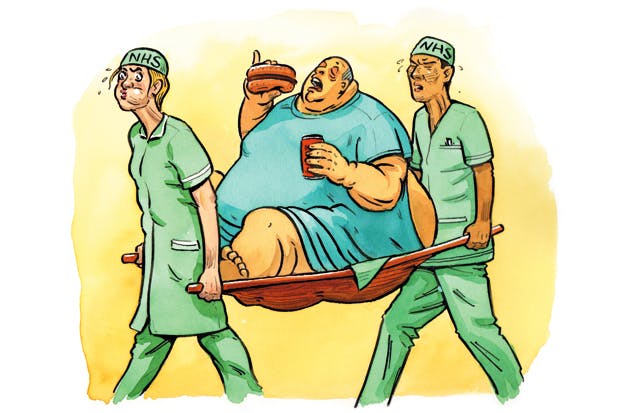by Critical Health
Well, its official, obesity is a disease. So declared the doctor delegates at the American Medical Association’s annual meeting this past June. Americans are the second fattest people in the world (second only to Mexico, and only by 1 percent, according to Scripps Media Inc.). According to Dr. Patrice Harris, a member of the association’s board, considering corpulence as a doctor issue is good thing. “Recognizing obesity as a disease will help change the way the medical community tackles this complex issue that affects approximately one in three Americans, in the words of Dr. Harris.
How exactly these changes will show up remains to be seen. AMA doctors say reclassifying it as a disease will reduce the stigma that can result from the silly idea that obesity is simply the result the result of too much food and too little exercise. Apparently, our medical saviors feel that their patients do not have control over their weight and physiology.
It’s not like modern medicine has a great or even good track record when it comes to dealing with the diseases that are already on its plate. Americans spend more money on doctor care than any other country in the world. And for all those dollars spent, we are statistically worse off than any other country in nearly every single marker of health, including disease incidence, infant mortality and longevity. And now the geniuses of the American Medical Association want us to trust them to deal with another “growing” health crisis?
Could it be that after medicalizing obesity there will be even more high-tech medical options than bariatric surgeries and gastric banding? Or, will we have even more potent anti-obesity medications? Interestingly, two anti-fat pharmaceuticals were released the same month as the American Medical Association’s decree.
The first, Qsymia is combination of a couple of poisons (drugs). One, called phentermine is an amphetamine like stimulant that has been available for over 40 years and was the second agent of the famous weight loss combo therapy known as “Fen-phen”. Phentermine use is associated with a whole host of adverse reactions including: fainting, dizziness, inability to exercise and insomnia. The other is a seizure medicine called topiramate, which boasts its own unpleasant side effect profile including: skin rashes, digestive difficulties, uneven heartbeat, muscle coordination issues and problems breathing. Nonetheless, if you want to drop a few pounds and don’t mind taking an anti-convulsant and speed to do it, Qsymia is the choice for you!
The second, Belviq works by activating one of the body’s stress management hormones, serotonin. In a fashion similar to (although not the same as) Prozac and other SSRI drugs, Belviq works by essentially potentizing the action of this important neurotransmitter; appetite is suppressed, satiety induced and vigilance and alertness promoted. Belviq essentially puts the body on an emergency status which has the effect of reducing hunger and the desire to eat. Unfortunately, as with all prescription medications, adverse reactions are possible, including: low blood sugar (hypoglycemia), mental problems, slow heartbeat, headache, dizziness, fatigue, nausea, dry mouth and constipation. One of the more insidious results of the doctor’s decision to label obesity as an illness is the fact that now 100 million Americans will be considered diseased. And that of course means medical treatment and overtreatment. Essentially the AMA has now made one third of all American’s wards of the medical model. And that’s a lot of new customers!
Obesity is no more of an illness than meth-rotting teeth and gums are dental disease or self-injurious cutting is a skin disease. It is, for the most part, (with some exceptions) a consequence of lifestyle choices and behaviors that are none of the medical model’s or your doctor’s businesses. Even though physicians would love nothing more than to have another billable, reimbursable product (and that’s what so-called diseases are), medicalizing obesity is a classic case of the camel sticking his nose under our tents. And make no mistake about it. If the camel is the medical model, you can rest assured, it’s being ridden by a government bureaucrat.



